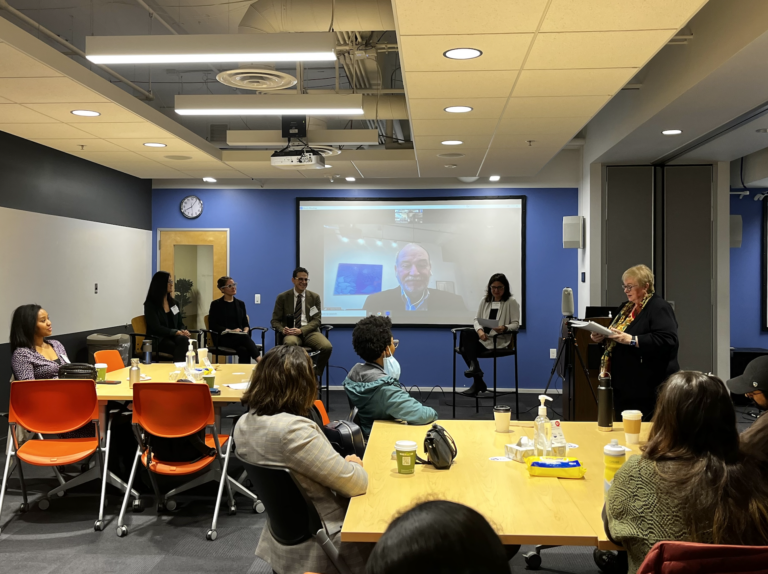
- Kim Kisner
- Events
- 10/24/2023
Experts on Clean Energy and Infrastructure Weigh in on Opportunities for Businesses at SBND Event

The Inflation Reduction Act of 2022 marks the single largest investment in climate and energy in American history and provides potentially transformational opportunities for businesses and organizations of all sizes.
On October 17, SBN Detroit hosted an informative discussion regarding these opportunities as well as those under the Infrastructure Investment and Jobs Act of 2021. The discussion focused on clean energy programs, available resources, workplace infrastructure, integrating different forms of funding, and partnerships. A list of resources is at the end of this article.
The panelists were:
Jerry Davis, professor, Ross School of Business, University of Michigan, oversees +Impact Studio and is faculty director of Business + Impact.
Stacey Grant, principal and founder of Path Consulting, which offers equity-centered consulting support for communities, organizations, and nonprofits.
Elizabeth Wallace, associate director, Michigan Community Programs, Elevate Energy
Zachary Kolodin, chief infrastructure officer, State of Michigan
The event was moderated by Nina Misuraca Ignaczak, founder, publisher, and editor of Planet Detroit, a digital media startup with a mission to produce quality climate, equity, health, and environmental journalism in the public interest.
Takeaways follow:
- Kolodin: Michigan is a model for the country. Our main goals are to make sure the state gets internal justice for our projects and to bring in quality jobs. It is a great time to be in state government.
- Grant: The funding and resources are meant to benefit your communities. We need to advocate and make this happen, and we can do this in a data-driven way.
- Davis: The IRA is like gelato. There are thousands of programs and a lot of acronyms. There are also some great resources to look at that are specific to Michigan. It’s really important to familiarize yourself with the basics of what is out there.
- Grant: We are talking about funding that isn’t a cycle. It is rolling out through 2032. This is a moment, but we are also talking about longevity. If you are not in the game, you can still get in the game, and win the game.
- Kolodin: When we talk about workforce infrastructure in this space, we often miss the capital needed. When we look at skills, when we look at humans, we fail to look at access to capital and replicating the needed qualities for the replication of these skills in the workforce.
- Kolodin: The IRA creates obvious funding opportunities to create a low-interest capital fund to support entrepreneurs in this space. We need to look into how to create a fund like this and get access to capital. We need to get creative to get money where it needs to be.
- Wallace: Through the IRA, there is the greenhouse gas production fund. This is funding that is going to capitalize on these clean energy products. There is pro-bono technical assistance and legal support for communities and residents to try to alleviate the complexity if you are a business owner looking to do energy projects.
- Wallace: There are a lot of incentives for cities to partner with other cities, community organizations, and local businesses.
- Davis: It’s important to focus on mid-management. Commitment from senior leaders matters, but midlevel leaders and managers make the difference day-to-day.
- Michigan Saves is a great resource. I felt they were really helpful specifically for contractors because there are so many details in the IRA – and they simplified things greatly.
- Wallace: If you are looking to receive capital, there are a lot of different ways to get into the programs and the funding that is coming from the IRA. Keep an eye on what is going on locally and regionally and see where some of these things align with your organization and if you want to expand into it.
- Wallace: It’s a time to really collaborate with other organizations with similar goals and local, state, and regional governments to see what programs are coming down the line that may be beneficial for your organization.
- Grant: We are dealing with crises daily. A shift in power is required. I invite people who are in positions of power and who have access to information and resources to make themselves available. If you do not have that invitation, then you need to create that relationship.
Click here for a list of resources.
Be sure to subscribe to our newsletter for regular updates on sustainable business practices in and around Detroit.
Kim Kisner
- All
- Business
- Community
- Education
- Events

ZF Group, a global technology company with its North American headquarters in Northville, specializes in systems for passenger cars, commercial vehicles, and industrial technology. With a focus on next-generation mobility, the company develops solutions that address electrification, automation, and digitalization while aiming to improve safety, efficiency, and sustainability in transportation. SBN Detroit interviewed Anuj Shah, Sustainability Lead, for the Americas, to explore the most pressing environmental challenges in...

The Chip Bag Project, based in Detroit, is a sustainability initiative that upcycles hard-to-recycle snack packaging — particularly chip bags — into insulated sleeping bags for individuals experiencing homelessness. Founded by Eradajere Oleita, the project addresses both environmental waste and housing insecurity by transforming materials like Mylar into practical, thermally efficient solutions. In June, Oleita was among Trelllis’s 30 Under 30, its annual recognition of the brightest young...

PowerPanel, headquartered in Oxford, focuses on sustainable energy technology with a particular emphasis on hot water systems and thermal energy capture. The company designs and manufactures modular solar hybrid systems that integrate both photovoltaic and thermal components into a single unit. Its goal is to offer energy solutions that are more efficient, durable, and economically viable for a range of commercial and industrial applications. SBN Detroit interviewed Garth...







